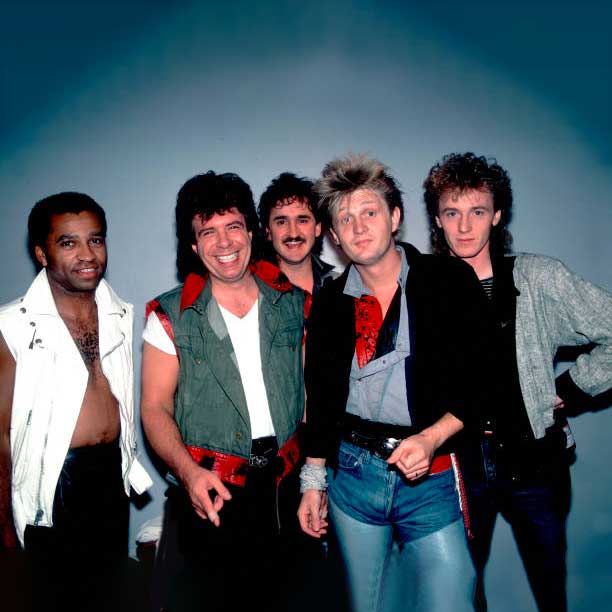Raoul Wallenberg, the Swedish diplomat celebrated for saving thousands of lives during World War II, may seem like an unlikely source of inspiration for a classic rock mainstay, but the hit song Wallenberg sparked, Red Rider’s “Lunatic Fringe,” remains as earnestly powerful — and as sadly topical — as it did back in 1981.
Singer/keyboardist Peter Boynton, guitarist Ken Greer and drummer Rob Baker founded Red Rider in 1975, joining forces with guitarist Arvo Lepp and bassist Jon Checkowski to perform original songs and crowd-favorite covers in and around the hard rock band’s native Toronto. Manitoba-born singer/guitarist Tom Cochrane joined the lineup in 1978 at the urging of Capitol Records; Lepp and Checkowski exited soon after, and with the addition of bassist Jeff Jones (who co-founded iconic Canadian power trio Rush in 1968, stepping aside a few months in to make way for Geddy Lee), Red Rider issued its debut LP Don’t Fight It in the autumn of 1979. The single “White Hot,” co-written by Cochrane and Greer and inspired by the transgressive French poet Arthur Rimbaud, reached number 20 on the Canadian charts, and the album was eventually certified platinum.
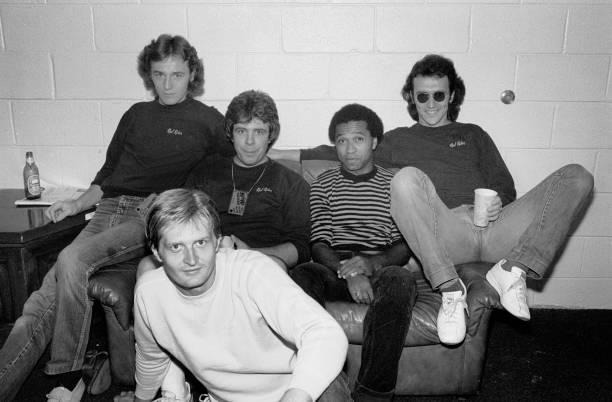
Cochrane authored “Lunatic Fringe” for Red Rider’s second album As Far as Siam, released in June 1981. Alarmed by a resurgence in antisemitic violence and vitriol, Cochrane picked up a book on Wallenberg, the former architect and businessman who served as Sweden’s special envoy in Nazi-occupied Budapest between July and December 1944. There Wallenberg hatched a plan to grant Hungarian Jews safe passage out of Nazi-controlled territory by producing and distributing falsified Swedish passports; he also converted 32 Budapest buildings into safehouses, avoiding Nazi detection by festooning them with signs (e.g., “The Swedish Library” and “The Swedish Research Institute”) as well as oversized Swedish flags. It is estimated that Wallenberg and his associates issued Swedish passports to 20,000 of Budapest’s Jews and safeguarded another 13,000 from the Nazis’ concentration camps before his still-unexplained disappearance in January 1945, months before World War II ended.
“Lunatic Fringe” calls out antisemites, neo-Nazis and racists of all shapes and sizes, and warns them the resistance is spoiling for a fight. “We know what you’re after/We’re wise to you this time,” Cochrane sings, adding “We’re on guard this time/Against your final solution,” the song’s most direct allusion to German dictator Adolf Hitler, the monster responsible for the genocide of about six million Jews and millions of other victims. “[‘Lunatic Fringe’ is] about being vigilant, about our freedom,” Cochrane told Toronto radio station Boom 97.3 in 2017. “Everybody was saying, ‘What are these lyrics? These are way too heavy for rock and roll. Why don’t you just get down to writing a pop song? Just write some pop lyrics and let’s get on with it.’ And I thought, ‘No, this is important to say.’” Cochrane first demoed “Lunatic Fringe” on Dec. 8, 1980, the same evening a deranged fan shot and killed John Lennon in the archway of the Dakota, the former Beatle’s longtime New York City residence; Cochrane later credited Lennon’s murder for giving him the courage and resolve to release the song, despite its chilly reception in some quarters.
Red Rider’s studio version of “Lunatic Fringe” — a mid-tempo, minor-key missive recorded at Los Angeles’ Sunset Sound under the supervision of producer Richard Landis — stood out from everything else on the radio at the time of its release, highlighted by the foreboding synthesizer that opens the track and by Greer’s searing, heavily-distorted pedal steel guitar solo, which is directly influenced by David Gilmour’s work on Pink Floyd’s “One of These Days,” from 1971’s Meddle. “Lunatic Fringe” almost immediately struck a nerve on album-oriented rock (AOR) radio, a format then becoming dominant throughout North America, and its music video also enjoyed heavy rotation on fledgling cable network MTV, lifting the single as high as number 11 on the Billboard rock radio airplay chart — Red Rider’s biggest hit to date. “Lunatic Fringe” resurfaced in 1985 in the Hollywood feature Vision Quest and appeared on its official soundtrack album, which sold more than a million copies thanks to its inclusion of Madonna’s chart-topping ballad “Crazy for You.” It also turned up that same year on Miami Vice, NBC television’s tastemaking cop drama.
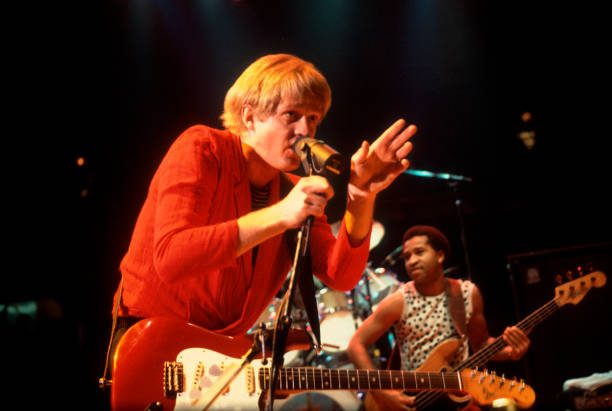
Red Rider never matched the success of “Lunatic Fringe” in the U.S., although the band was a reliable hitmaker at home in Canada before splitting in 1990. Cochrane went solo a year later with the anthemic “Life Is a Highway,” which topped the Canadian pop chart and peaked at number six on the US Billboard Hot 100 in August 1992. He reunited with Greer and Jones under the Red Rider aegis in 2002 to play a benefit show celebrating the life of the band’s former guitar tech John Garrish, who was mugged and fatally stabbed in Toronto’s Yorkville district; from there, Cochrane and Red Rider toured annually for decades to follow. Raoul Wallenberg, meanwhile, continued making posthumous headlines even after “Lunatic Fringe” peaked at radio: on Oct. 6, 1981, he was named just the second honorary citizen of the United States, joining another World War II icon, former U.K. prime minister Winston Churchill. The bill was sponsored by California congressman and Budapest native Tom Lantos, who at 16 years old managed to escape Nazi Europe with a Swedish passport arranged by Wallenberg. His life and times later inspired Laurence Holzman, Felicia Needleman and Benjamin Rosenbluth’s theatrical musical Wallenberg, which premiered in 2010.
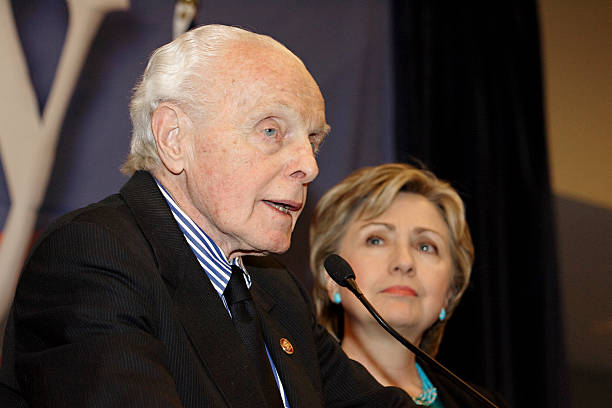
And although “Lunatic Fringe” was never a massive success, it’s never quite vanished from classic rock playlists, either, mostly because the insidiousness the song attacks remains so pervasive in our culture, metastasizing even deeper into the American bloodstream after extremist media darling Donald Trump claimed the U.S. presidency in 2016. “The undercurrent of indigence and violence and hate, as evidenced by the election of Trump, makes this an evergreen song,” Rock and Roll Hall of Famer Todd Rundgren told Rolling Stone in 2017. “But now the lunatic fringe is no longer the fringe.” In fact, the Anti-Defamation League reported the number of antisemitic incidents documented in the U.S. surged to nearly 3,700 in 2022, up 36 percent year over year — the most activity since the Jewish advocacy group started keeping track in 1979. Moreover, antisemitism in America is no longer limited to physical attacks, online harassment and small-press screeds: influential voices including hip-hop superstar Ye (formerly Kanye West), NBA champion Kyrie Irving and disgraced FOX News anchor Tucker Carlson have all spread antisemitic rhetoric from their respective bully pulpits.
“I’m not proud of the fact that ‘Lunatic Fringe’ is probably as impactful now as it was back then, but the reality is that it is,” Cochrane told The Canadian Jewish News in 2021. “‘Lunatic Fringe’ should be disturbing, but it should also be a cause for hope, because, like I say in the song, there are those of us out here that aren’t gonna let those things happen again. And you gotta speak out when you see injustice. It’s a song about standing up for what is right, so I’m proud of the song from that point of view — proud that I could say something.”
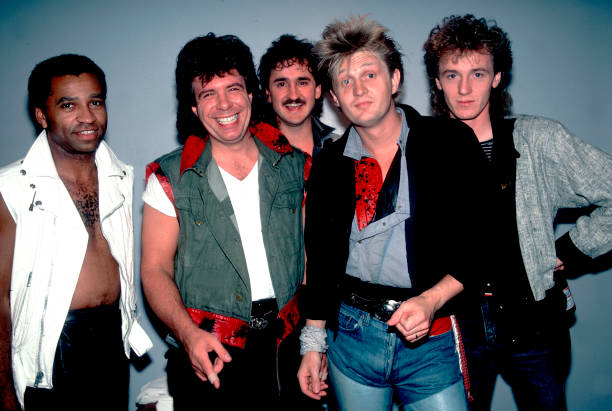
Lunatic Fringe (KORD-0034)

